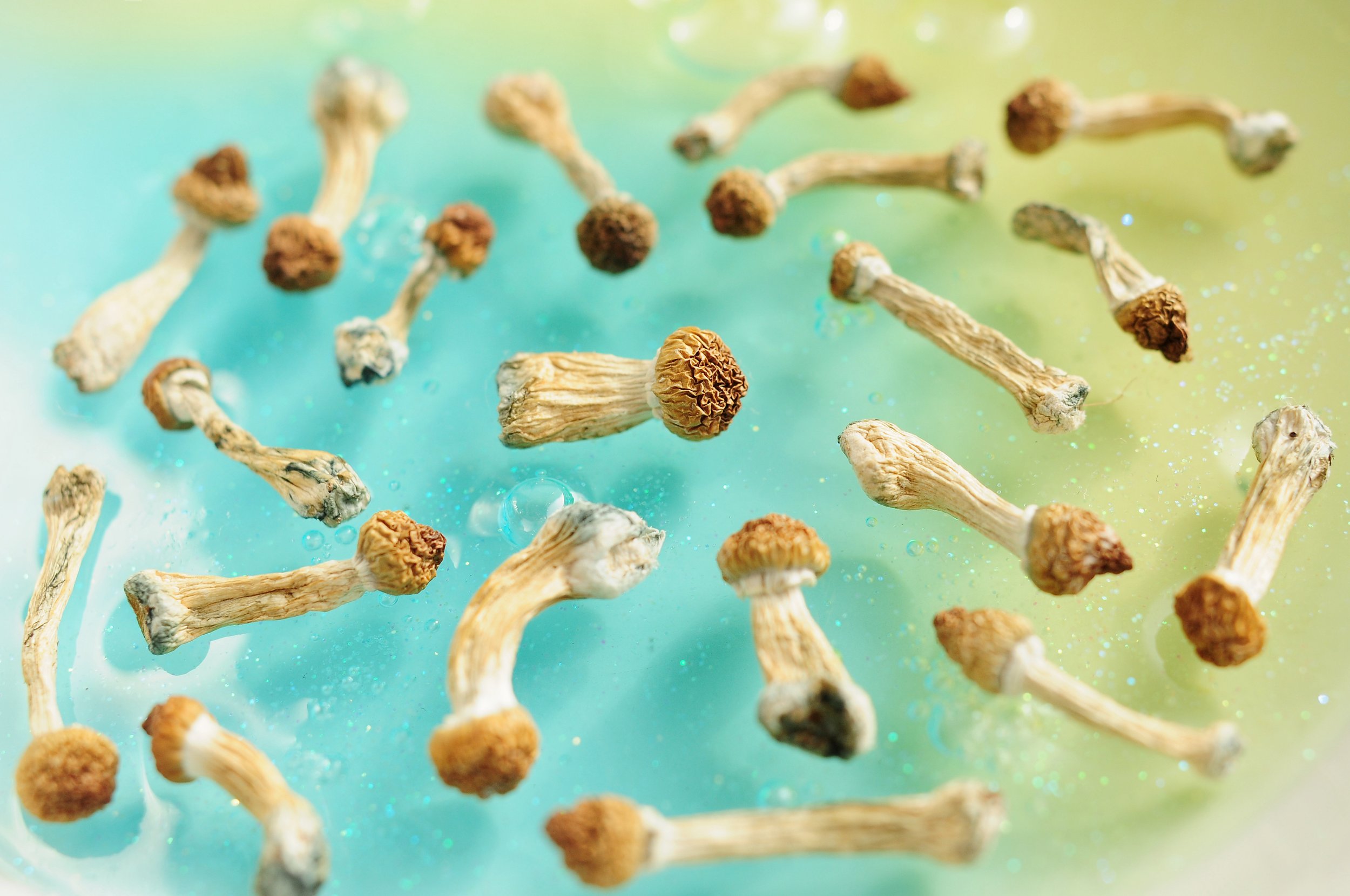
Psilocybin
Learn about magic mushrooms, the research and potential benefits.
Psychedelic research is unlocking new therapeutic possibilities, with psilocybin at the forefront. This naturally occurring compound, found in certain fungi and often referred to as magic mushrooms or psychedelic mushrooms, has been recognized by the FDA as a Breakthrough Therapy. Its potential in treating various mental health challenges is currently being explored, marking a significant shift in the understanding and treatment of these conditions.
History & renaissance
Psilocybin, a classic psychedelic, has been valued for its mind-altering effects for thousands of years across various cultures. Ancient civilizations, such as the Aztecs, used it in spiritual rituals, calling it “the flesh of the gods.” This practice diminished during Spanish colonization but resurfaced in Western awareness following the 1957 Life Magazine article that highlighted Robert Gordon Wasson's encounter with Maria Sabina, a Mazatec healer renowned for her healing sacred mushroom ceremonies, called veladas. This led scientists like Albert Hofmann, who synthesized psilocybin, and psychologists like Timothy Leary and Richard Alpert at Harvard, to explore its ability to expand consciousness.
In more recent years, studies have examined the effects of psilocybin on neurological activities and its potential benefits in treating resistant mental health and substance use disorders. This research has expanded the understanding of psilocybin beyond its traditional recreational use, positioning it as a valuable mental health tool. Studies have shown that psilocybin can also aid in smoking cessation and alcoholism, marking a shift in how these challenges are approached.
Magic Mushroom Benefits
Psilocybin, a compound in certain mushrooms, transforms into psilocin in the body. This substance can have a profound impact on the brain by altering perceptions, mood, and thought processes. Clinical trials have shown these changes may be beneficial for various mental and physical health issues such as anxiety, depression, post-traumatic stress disorder (PTSD), obsessive compulsive disorder (OCD), substance abuse, sleep disorders, chronic pain, anorexia, and cluster headaches. Psilocybin may also benefit emotional challenges like grief.
In addition, psilocybin has the potential to offer insights into deep-seated beliefs, promote emotional healing, boost compassion, and stimulate creativity. On a spiritual level, it can facilitate a profound connection with the world, enhancing life appreciation and rejuvenating the inner self. Research supports these benefits, showing psilocybin's potential effectiveness in reducing depression and anxiety in cancer patients facing life-threatening situations, aiding in end-of-life care, and promoting lasting improvements in psychological health, empathy, and overall well-being.
MIND-BLOWING JOURNEY
“What transpired during my journey was mind-blowing and I can't stop thinking about it…”
— K.W. from Oregon

psilocybin Research
Ready to discover how magic mushrooms can change your mind? Clinical research shows that psilocybin is paving new ways to understand and address mental health issues. The following information explains how psilocybin interacts with the brain, shifts thinking, and unlocks new perspectives, shedding light on its potential for personal growth and transformation.
Watch: How to Change Your Mind, episode two.
5-HT2A Receptors
The benefits of psilocybin are largely due to its interaction with 5-HT2A receptors in the brain. Its structure is similar to the neurotransmitter serotonin, and it works by binding to serotonin receptors, particularly the 5-HT2A receptors. Serotonin is essential for controlling mood, memory, behavior, learning, and sleep. Psilocybin's interaction with these receptors results in better neural communication, reduced default mode network (DMN) activity, and less repetitive thought patterns.

Default Mode Network
Psilocybin research often focuses on its impact on the default mode network (DMN) in the brain, which is involved in self-reflection, rumination, reducing uncertainty, and keeping things in order. When the DMN is overactive, it leads to mental health problems like anxiety, depression, addiction, and OCD. Psilocybin calms this overactivity. Like shaking a snow globe, psilocybin briefly disorganizes brain activity which can break repetitive and unhelpful patterns of thinking and behavior.
Mystical Experiences
Psilocybin can elicit mystical experiences, causing significant emotional and perceptual shifts. Research participants report that their sessions were deeply meaningful and spiritually impactful, leading to improvements in mood and happiness. Studies have shown a connection between the depth of mystical experiences and psilocybin's success with mental health issues like depression and tobacco addiction, highlighting the importance of these experiences for well-being.

Better Brain Function
Psilocybin can help the brain grow new connections and cells, a process vital for developing healthier thought patterns. Research shows that psilocybin increases the brain's interconnectedness, allowing areas that don't usually communicate to connect. This leads to a reduction in the usual activity within local brain networks. Such disruption results in a sort of organized chaos in the brain that offers new insights, showcasing psilocybin's ability to positively change and improve the way our brain works.
Ego Dissolution
Moreover, psilocybin can lead to ego dissolution, where the usual constructs of self and autobiographical memory are broken down, often resulting in a feeling of reconnection with the world and others. This is frequently described as a religious or spiritual experience, characterized by a sense of unity, sacredness, and transcendence beyond time and space. Such mystical experiences are often ranked among the most meaningful events in a person's life, comparable to the birth of a child or the death of a parent.
gUIDED TO SUCCESS
“After reading about the use of psilocybin as a form of therapy I felt it could be helpful for me. Cate guided me throughout the process. The day of my psilocybin journey, she remained by my side, observing and offering support. My experience was everything I was hoping for. Cate truly guided me to success.”
— Norma S. from Washington

